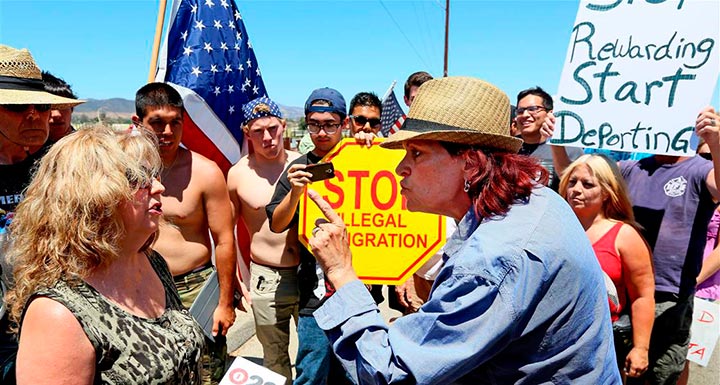
Poll: Immigrants seen as economic plus with border crisis over
WASHINGTON.- Americans who were shaken up by this summer’s influx of children and families from Central America have regained confidence that immigrants are more of a plus than a burden.
Polling by Public Religion Research Institute, PRRI, shows fears that immigrants are taking jobs, housing and health care have fallen to levels close to those seen before the summer crisis.
In early May, 61 percent of people surveyed by PRRI saw immigrants as strengthening the country, versus 29 percent who saw them as a burden. By mid-July, those numbers dropped to 48 percent and 41 percent respectively. Those concerns were real when people were seeing the headlines on a daily basis about the crisis, said Robert Jones, CEO of PRRI.
But by the end of September, according to new polling numbers released Thursday by PRRI, 54 percent of Americans saw immigrants as a economic plus and 35 percent as an economic burden.
Despite the ups and downs of Americans’ economic feelings about immigrants and the rhetoric of midterm elections, PRRI’s polling also shows that Americans’ support for a path to citizenship for immigrants illegally in the country remains consistent, logging at 60 percent at the end of September.
Overwhelming majorities of Republicans, Democrats and Independents support paths to citizenship, the poll shows.
Interestingly, while just 37 percent of tea party members support a path to citizenship, permanent legal residency without citizenship gets 23 percent of tea party members’ support. That’s a total of 60 percent support for some level of legalization among the group seen as the reason why House members refused to take up immigration reform this year, according to PRRI’s data.
The survey results were part of a “strategy session” titled Immigration 2020 held by the National Immigration Forum and titled Immigration Thursday.
The National Immigration Forum has focused for about the past seven years on building conservative and Republican support for immigration reform. It has brought together law enforcement and business leaders and has been critical in growing support among white evangelicals, many who have taken the lead on pushing for reform.
Although support for a path to citizenship had dropped during the summer to 48 percent of white evangelicals, that number notched up to 55 percent by the end of September. Add to that another 12 percent who support legalization without citizenship.
“Between now and 2020 there are four electoral cycles and there are an infinite number of legislative opportunities to realize the policy change that we all want,” said Ali Noorani, the forum’s executive director.
“We’ve had a rough and tumble year in terms of the debate but what has happened is that the public has come back to a place where we want a solution and we see immigration as a benefit,” he said.
In a morning panel, conservative commentator Linda Chavez said white, southern males are feeling under siege and feel they are losing power, which she said is driving politics.
Although not all immigrants are Hispanic, the anxiety often is aimed at Hispanics, said Chavez, head of the Becoming American Institute and the leader of a successful effort to make English the official language in Colorado.
Jones said four-in-10 Americans live in what he called “high economic insecurity” households, so it doesn’t take much for the attitudes about immigrants being a burden to kick in.
Douglas Holtz-Eakin, a former economic adviser to Sen. John McCain’s 2008 presidential campaign, said he sees this year’s immigration debate as far less rancorous than previous years, with greater recognition that the immigration system is broken.
“That makes me think that we can get past the border crisis of 2014 and get to 2015 and begin the legislative work of fixing the immigration system. We’re there,” he said.
Several economists said for a story in Thursday’s New York Times they are underwhelmed by the economic agenda Republicans may push should they take control of the Senate in November. The GOP already controls the House and that’s not expected to change.
Immigration reform is not on the “bipartisan jobs list” of Senate Republicans, despite Congressional Budget Office findings that the bipartisan bill passed in the Senate in 2013, but that House Republicans refused to consider, would increase economic growth 3.3 percent and save $175 billion over 10 years, the Times reported.
But Holtz-Eakin said immigration reform eases finding solutions to many of the challenges the nation is facing, such as its debt problem, education concerns and entitlement program costs.
“Big reforms have a bipartisan nature. This (immigration) is the closest to maturity in a bipartisan sense … Electorally, Republicans need to do something … They have to get something in place for 2016. That makes it more urgent,” Holt-Eakin said.
But he also said that executive action by President Barack Obama on immigration would make immigration reform more difficult.
(From the: NBC News)

